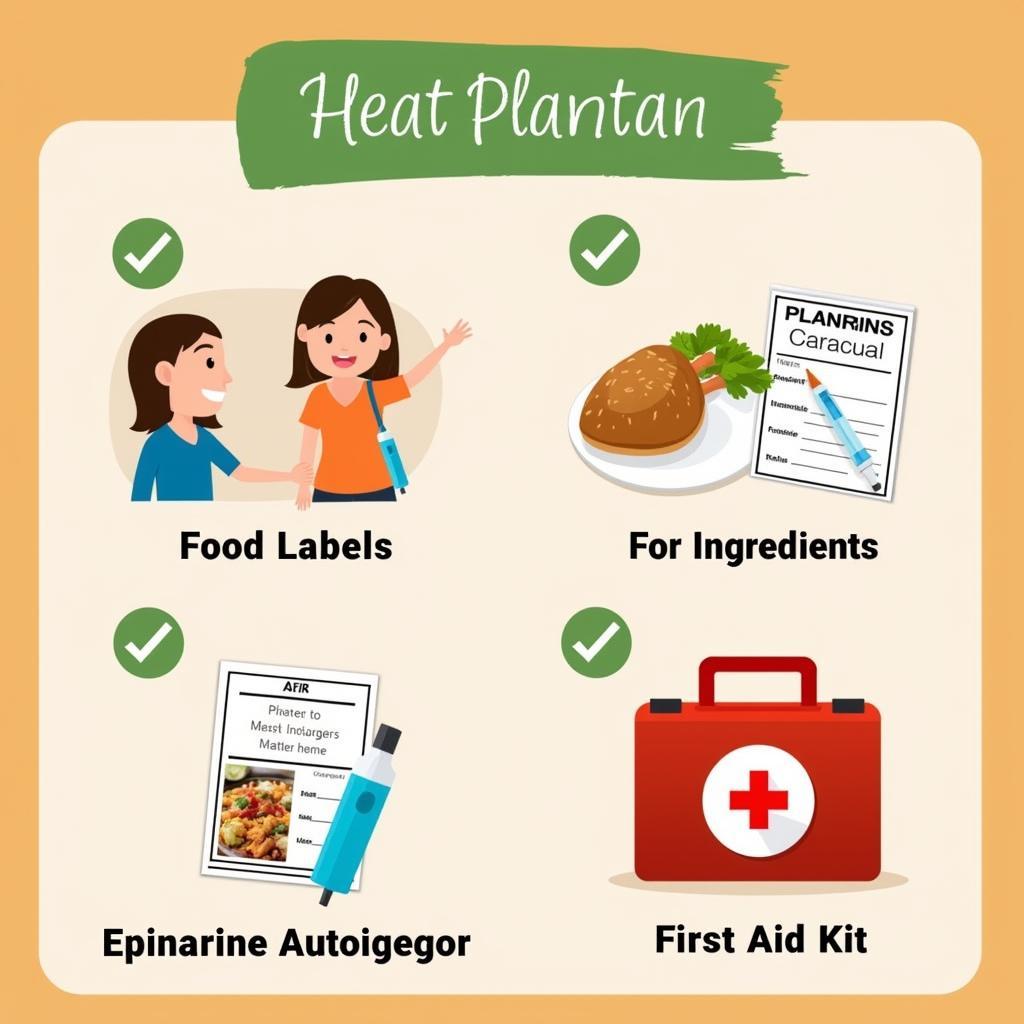Plantain Food Allergy is a relatively uncommon but potentially serious condition that can cause a range of symptoms, from mild itching to life-threatening anaphylaxis. Understanding this allergy, including its triggers, symptoms, and management strategies, is crucial for anyone affected. This comprehensive guide will explore everything you need to know about plantain food allergy.
What is Plantain Food Allergy?
A plantain food allergy occurs when your immune system mistakenly identifies proteins in plantains as harmful invaders. This triggers a cascade of reactions, leading to the release of histamine and other chemicals that cause allergic symptoms. While plantains are a nutritious and versatile food, for some, they pose a significant health risk.
Recognizing the Symptoms of Plantain Food Allergy
Plantain allergy symptoms can vary significantly from person to person and can range from mild to severe. Some common symptoms include:
- Skin reactions: Hives, itching, eczema, and swelling.
- Oral allergy syndrome (OAS): Itching or tingling in the mouth, throat, and lips.
- Digestive issues: Nausea, vomiting, diarrhea, and abdominal pain.
- Respiratory problems: Wheezing, coughing, shortness of breath, and nasal congestion.
- Anaphylaxis: A severe, life-threatening reaction that can cause difficulty breathing, a drop in blood pressure, and loss of consciousness.
english plantain allergy foods to avoid
Diagnosing Plantain Food Allergy
If you suspect you have a plantain allergy, it’s essential to consult an allergist. They may perform several tests, including:
- Skin prick test: A small amount of plantain extract is pricked onto your skin to see if a reaction occurs.
- Blood test: This test measures the amount of plantain-specific IgE antibodies in your blood.
- Oral food challenge: Under medical supervision, you consume small amounts of plantain to determine if you have an allergic reaction.
Managing Plantain Food Allergy
The most effective way to manage a plantain food allergy is strict avoidance. This includes reading food labels carefully and being mindful of cross-contamination.
Tips for Avoiding Plantains
- Read labels thoroughly: Be aware that plantains can be hidden in processed foods under different names.
- Communicate your allergy: Inform restaurant staff and family members about your allergy to avoid accidental exposure.
- Carry an epinephrine auto-injector: If you have a history of severe reactions, your doctor may prescribe an epinephrine auto-injector (e.g., EpiPen) to use in case of anaphylaxis.
- Be cautious of cross-contamination: Avoid using the same utensils or cutting boards for plantains and other foods.
 Managing Plantain Food Allergy at Home
Managing Plantain Food Allergy at Home
dairy free gluten free party food
Living with Plantain Food Allergy
Living with a plantain food allergy can be challenging, but it is manageable. By being vigilant about avoiding plantains and being prepared for potential reactions, you can minimize your risk and live a full and active life.
Can plantain allergy be outgrown?
While some food allergies can be outgrown, it’s less common with plantain allergy. It’s crucial to continue following your allergist’s recommendations, even if you haven’t experienced a reaction in a while.
What if I accidentally eat plantain?
If you accidentally consume plantain, take antihistamines as directed by your doctor. If you experience severe symptoms, such as difficulty breathing or swelling of the throat, use your epinephrine auto-injector immediately and seek emergency medical attention.
“It’s crucial to remember that even a small amount of plantain can trigger a reaction in someone with a severe allergy,” says Dr. Amelia Carter, a leading allergist. “Vigilance and preparedness are key to managing this condition effectively.”
Conclusion
Plantain food allergy can present significant challenges, but with proper management, those affected can lead healthy and fulfilling lives. By understanding the risks, recognizing the symptoms, and taking proactive steps to avoid plantains, you can effectively control your allergy and minimize the chances of a reaction. Remember to consult with an allergist for personalized advice and treatment.
If you suspect you have a plantain food allergy, don’t hesitate to seek professional medical help. Early diagnosis and management are essential for minimizing the risks and improving your quality of life.
When you need assistance, please contact us at Phone Number: 02437655121, Email: minacones@gmail.com, or visit our address: 3PGH+8R9, ĐT70A, thôn Trung, Bắc Từ Liêm, Hà Nội, Việt Nam. We have a 24/7 customer service team.